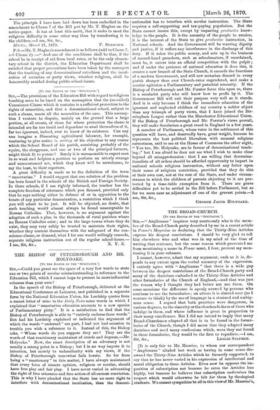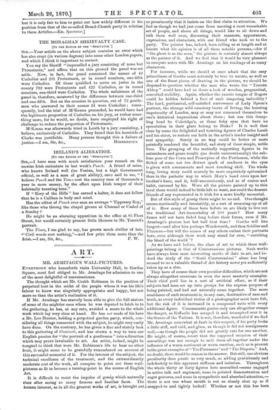THE BROAD-CHURCH.
[TO THE EDITOR OF TILE "SPECTATOR."] Anglicanus " inquires very courteously who is the mem- ber of the Broad-Church party described by me in a recent artide- in Fraser's Magazine as declaring that the Thirty-Niue Articles. express his deepest convictions. I should be very glad to tell him elsewhere who and what was in my mind at the time of writiog that sentence, but the same reason which prevented me- from mentioning a name in Fraser must, I fear, prevent my men- tioning it in your columns.
I cannot, however, admit that my argument, such as it is, de- pends to any extent upon the verbal accuracy of the expression. I entirely agree with " Anglicauus " that there is a wide gap between the deepest convictions of the Broad-Church party and. many of the doctrines embodied in the Thirty-Nine Articles and other formularies of the Church of England,—and that was just. the reason why I thought they had better not use them. On some occasions the difference is openly avowed by persons who. continue to use the formularies ; on others it is slurred over (as I venture to think) by the use of language in a strained and ambig- uous sense. I argued that both practices were dangerous, in various degrees, to the sincerity or the clearheadedness of those whorn indulge in them, and whose influence is great in proportion to. their many excellences. But I did not intend to imply that many Broad-Churchmen adopted all that is to be found in the formu- laries of the Church, though I did mean that they adopted many doctrines and used many confessions which, were they not found in those formularies, they would be the first to repudiate.—I am, [It is only fair to Mr. Maurice, to whom our correspondent. " Anglicanus" alluded last week as having in some sense dis- owned the Thirty-Nine Articles which he formerly supported, to say that he has never varied in his expression of intellectual and moral obligation to those Articles. Even now he opposes the im- position of subscription not because he rates the Articles less. highly, but because he believes that subscription undermines the respect which would otherwise be felt for them by theological students. We cannot sympathize tst all in this viewof Mr. Maurice's,
but it is only fair to him to point out how widely different is his position from that of the so-called Broad-Church party in relation to these Articles.—En. Spectator.]



































 Previous page
Previous page